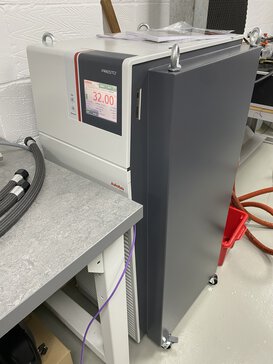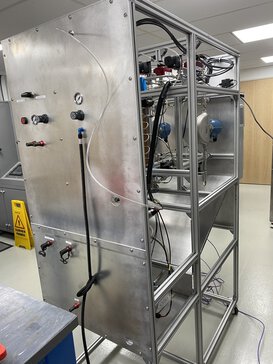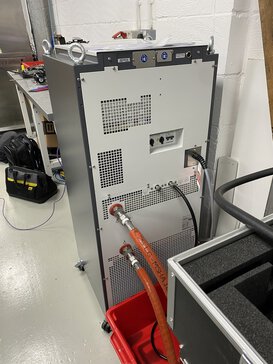Thermal Testing of FIA Sanctioned Ultrasonic Fuel Flow Sensors in Motorsport
08/02/2023
In the fast-paced world of motorsport, precision and accuracy are paramount. Ultrasonic fuel flow sensors have emerged as crucial components, ensuring optimal fuel delivery and performance in vehicles. These advanced sensors are not only integral to everyday cars but also play a vital role in FIA-sanctioned motorsport competitions, including Formula 1 and WEC. To guarantee reliable readings under demanding conditions, thermal testing of these sensors becomes imperative. The JULABO Presto A45 device has become the trusted solution for this vital task, forging a strong partnership with important British Automotive Component Manufacturers.

What are the Advantages of Ultrasonic Fuel Flow Sensors?
Ultrasonic fuel flow sensors have revolutionized the way fuel consumption is measured in modern vehicles. Unlike traditional flow meters, which rely on mechanical components, ultrasonic sensors employ non-intrusive technology. These sensors use ultrasonic waves to precisely determine the flow rate of fuel passing through the system. The absence of moving parts enhances their reliability, reduces maintenance needs, and ensures accurate readings over extended periods. Furthermore, their compact size and lightweight design make them ideal for integration into various vehicle systems, contributing to overall weight reduction and improved efficiency. The real-time data provided by these sensors enables efficient fuel management, optimizing engine performance and enhancing fuel economy, a crucial aspect in both regular driving scenarios and high-stakes motorsport competitions.
In the world of premium motorsport, where every fraction of a second counts teams must carefully manage their fuel usage throughout a race, as excessive consumption could lead to unscheduled pit stops, compromising lap times and overall race performance. Therefore, the Fédération Internationale de l'Automobile (FIA) has introduced stringent technical requirements and standards for the use of ultrasonic fuel flow sensors in all of their race categories, including the prestigious Formula 1 and the World Endurance Championship (WEC).
The Importance of Thermal Testing for Ultrasonic Fuel Flow Sensors
Thermal testing is crucial in verifying the robustness and accuracy of ultrasonic fuel flow sensors in varying environmental conditions. In the high-speed, high-temperature environment of motorsport, these sensors must consistently deliver precise readings. Thermal testing simulates a wide range of temperatures to assess sensor performance, ensuring they remain reliable even in the most challenging situations. Additionally, it helps identify any potential deviations or inaccuracies, allowing manufacturers to make necessary improvements and enhancements before the sensors hit the racetrack.
JULABO Equips the Testbench with its Presto A45
The requirements of our customer, a prestigious British Automotive Component Manufacturer, included a temperature range of -10°C to +80°C using automotive glycol. This specification was required to control the temperature of the fuel being passed through the flow sensor in a secondary loop. Our temperature control system is seamlessly integrated into their test-setup using the essential Ethernet-connectivity provided with the Presto System. With its exceptional temperature range, stability, and precision, the Presto A45 was the perfect choice for this application.
The outstanding performance of our products has earned JULABO the trust and partnership of our customer, making it the preferred choice for thermal testing in this critical field.



